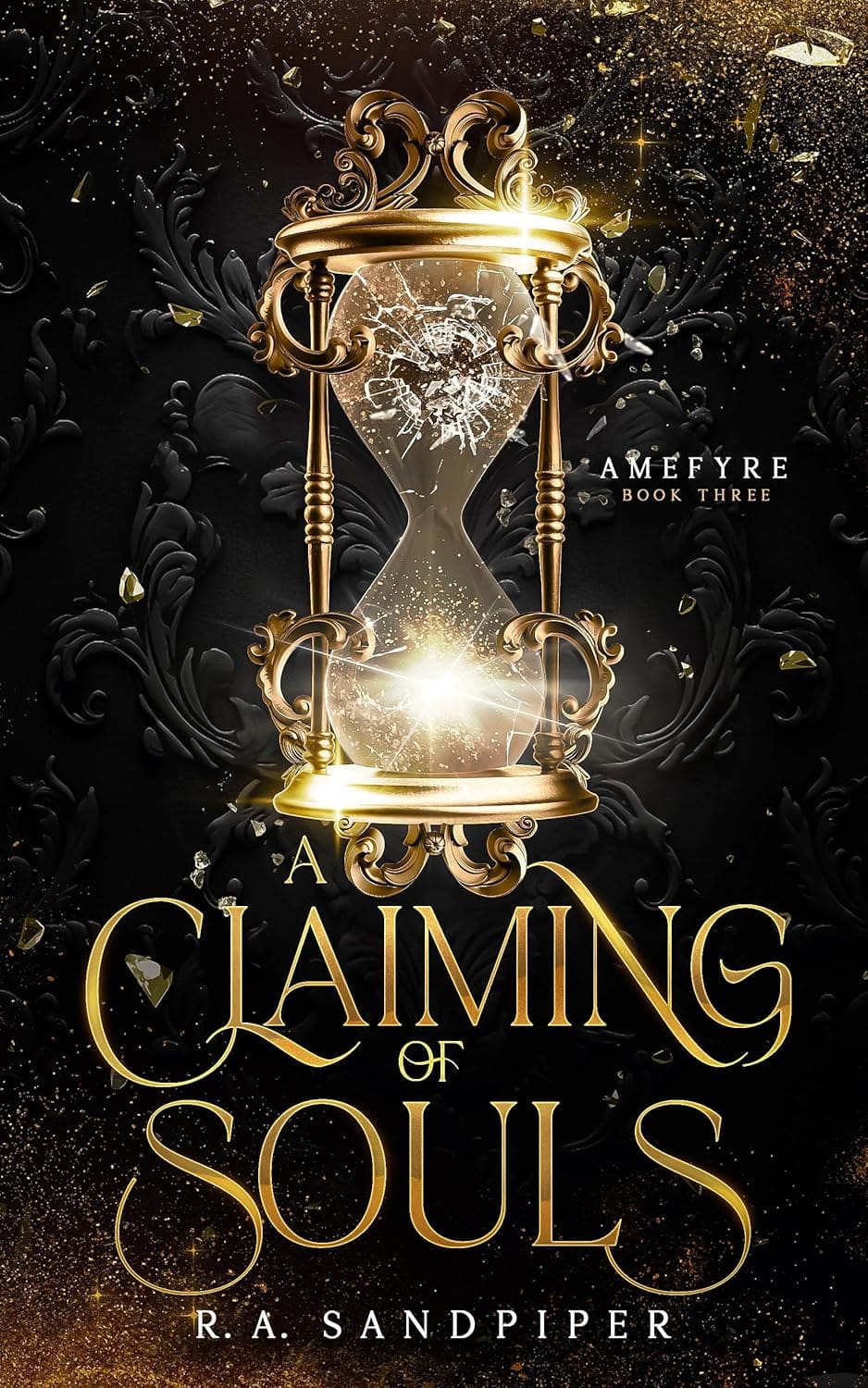
Warning: third degree slow burn ahead
Synopsis
A SOUL TAKEN. A SOUL RESTORED. A WAR AT HER FINGERTIPS.
Suri’s deal with the Fae has left her a shadow of herself. Revelations about the prophecy sew confusion, new allegiances come to light, and Suri grapples with the darkness inside her.
Insidious plots toll countless deaths as Lera steps closer to her ultimate goal. Time is not on their side, and it will take all of Suri’s strength—and some unlikely allies—to succeed.
In the gripping third book in the Amefyre trilogy, the world will be forever changed. But who will remain when the sand has settled?
Review
This is my third review of a book in the Amefyre series, which, depending on your take, could be called a (grim)dark fantasy with a slow burn romance at its core or a dark romantasy that doesn’t forget the tricksy politics and mysteries amid the spice. And they’re always hard to write, frankly, because this series, as hinted at by my sub-genre mental breakdown above, is a lot of things. Yes, there is a deliciously patient, realistic romance at its core, just as much about self-esteem and true consent as it is about the insatiable desire to rip clothes off (although there’s a lot of that, in an increasing frequency towards the potential, uh, climax). But there’s also marvellously grim and devious politics, twists and tricks, whether it’s fae bargaining for souls or a found family working together to forge alliances. And there’s a strong mystery element of dark gods, prophecies, and time magic which has kept me guessing just as much as the romance has kept me invested. Or to put it a much more succinct way, this is everything I want in a dark fantasy, and the fact it’s wrapped in some of the best dialogue out there is the icing on the most likely inedible Amefyre cake.
Which leads us to the concluder. The second book A Promise of Blood was a lightning evolution of the already enjoyable first one and perhaps my favourite dark fantasy of last year. Cue disappointment in the trilogy closer right? No. The Amefyre trilogy concludes with a bang so big you can see it from space and now joins the ranks of my favourite dark fantasy romance-flecked trilogies of all time.
Plotwise, we begin with the Peregrinus pieces all arranged nicely on the board: Queen Lera, she of the harpy tendencies and inability to get over her dead sister being better than her, just needs three more massacres to create the required gates to bring back our favourite creepy-tendrilled death god to the land. Kol, full of life with his soul back, has to seek support from as many of the political factions as he can, with his new Court by his side, including Suri, who is noticeably soulless and more death than life, and who must try and learn her time-travelling seer powers so she can stand a chance in the final battle to come.
There’s a lot to balance there as you can tell, but I’m pleased as Fae punch to report that it doesn’t feel crammed or rushed, with Sandpiper’s notable knack of tying together scene-stealing scene after scene-stealing scene still on display. A particularly clever trick of working out a way to keep the slow burn sizzling for another book is provided by Suri’s loss of her soul. The rationale behind why this affects their relationship is clever, based on the nuanced relationship between them both. This is what I love about this slowest of slow burns; it’s somehow at times mind-meltingly spicy, yet always rooted in a complex interplay of consent, self-esteem, patience and understanding. Kol may be a bit of a possession freak at times—he’s said “you’re mine” so many times at this point I’m surprised Suri hasn’t written him out a receipt to save him the bother—but he may also be one of the least toxic of the “hot villain” stereotypes in the genre, someone who has proved that he understood his beau long before he gave into her. Their relationship continues to be about gently pulling themselves out from Suri’s cycle of self-loathing and his anger demons. How this cycle completes would be telling, but it doesn’t disappoint.
But as I said earlier, Amefyre has never just been about central pairing but the Machiavellian politics around it, and here we see Suri once again bouncing between political factions, from the Pail which we finally get an (admittedly brief) taste of to a return to the Fae Glen. The Glen was arguably host to some of the best scenes in the second volume, and, for very different reasons, it leads to another memorable scene. Also, the found family aspect of the series which blossomed in the second book is strong here: Nadrian, Fae heir, gets his own poignant subplot and the relationship between Suri and Scilla comes full circle in a brief exchange that fundamentally broke me. For such a small subplot to be the one point that brought me to tears? That’s the power of dialogue, baby. Even cruel ice-mage Rasel gets a subtler arc. Sandpiper’s strength is in the slow, meaningful steps from distrust to friendship, supported by on-point dialogue. Speaking of dialogue, this is the Amefyre series’ secret weapon; the same whiplash, clever sparring that underpins the scenes of emotion also make this one of the funniest fantasies you’ll read all year.
But what slightly surprised me in a good way was the mystery behind the death god/life god figures of Diophage and Sotoledi (the gods of vowels, evidently) and how this interacts with Suri’s powers of time. This could easily have been a confusing mess given the number of things this trilogy closer has to do and crumbled the foundations of this finale like an army of moles under a castle. But I found it an absolutely compelling mystery, underscored by the frankly superb use of epigraphs to tease the secrets of the past. Trying to guess the identity of the epigraph author and the tragic events they foretold was almost as fun as the book itself. If you’re swooning over epitaphs, that normally means you’ve found a trilogy that hits the spot. And without spoiling anything, the suggestion of one character that everything that’s happened is down to two annoying men was an entirely fitting observation for a series that in many ways is about deconstructing the myth of power and legend and replacing it with funny, complex people learning to like their own semi-monstrous selves.
Overall, this is a perfect demonstration of the power of dark fantasy and frankly astonishing for an author’s first series. It’s been a genuine pleasure to be in the company of this world and these characters, and I’m going to miss them a lot. Read this.
Buy A Claiming of Souls direct from the author here







Leave a Reply